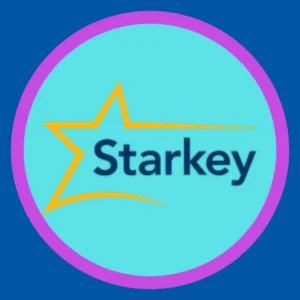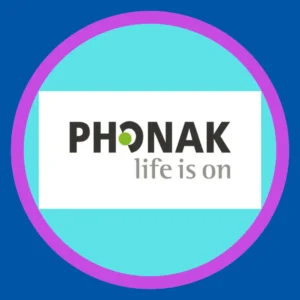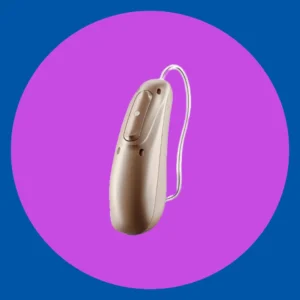Get to Know Phonak Audeo Hearing Aids and Starkey Edge Hearing Aids
Today’s hearing aids are far more than sound amplifiers. They are advanced devices that connect you to conversations, media, and even your health. Among the leaders are Phonak Audeo hearing aids and Starkey’s Edge AI models. Both use artificial intelligence, Bluetooth streaming, and rechargeable batteries. Both also offer unique strengths that set them apart.
This guide compares the two systems in detail. You’ll learn how Phonak focuses on effortless clarity, while Starkey emphasizes wellness and safety. You’ll also see where they overlap, how they differ, and which one may best suit your lifestyle.
Different Philosophies, Same Goal: Clearer Speech
Phonak and Starkey both aim to make speech easier to hear. But they take different paths to reach that goal.
Phonak: clarity through automation
Phonak Audeo devices rely on AutoSense OS and the new DEEPSONIC AI chip. This neural network was trained on 22 million sound samples. It identifies speech and separates it from background noise without your input. This design gives you steady clarity in busy environments.
Phonak also invests in reducing listening fatigue. Evidence from a Phonak study on Speech Enhancer and listening fatigue shows how technology can ease the effort of following conversations in noise.

Starkey: user control plus wellness
Starkey’s Edge AI line takes a slightly different approach. Its Neuro Processor powers real-time sound adjustments. When noise overwhelms, you can tap the device to activate Edge Mode+ for instant speech focus. This gives you manual control when you need it most.
Starkey also builds in wellness tools like fall detection, transcription, and activity tracking. According to a Starkey white paper on signal-to-noise ratio improvements, these features are paired with measurable gains in speech understanding in complex soundscapes.
Phonak vs. Starkey in a Nutshell
| Category | Phonak Audeo (Infinio / Lumity) | Starkey Edge AI / Genesis |
| AI design | Fully automated clarity with DEEPSONIC chip | On-demand Edge Mode+ plus wellness |
| Control style | “Set it and forget it” | Tap for speech boost |
| Unique strengths | Roger microphones for distance hearing | Fall detection and health tracking |
| Ideal user | Wants effortless speech clarity | Wants health and safety features |
How They Perform in Noisy Places
Busy restaurants and family gatherings are often the hardest situations.
- Phonak relies on constant automation. The dual-chip setup and Spheric Speech Clarity feature separate voices from background chatter without you needing to act.
- Starkey adapts automatically too, but you can step in. Edge Mode+ gives you a manual boost for those especially tough spots.
Both succeed, but the style of control differs. If you want no effort, Phonak may appeal. If you like having a button-like option, Starkey may be your fit.
Connectivity: Linking to Phones, TVs, and More
Streaming is essential today. Both systems offer strong performance, though in different ways.

Phonak: broad Bluetooth compatibility
Phonak Audeo devices connect to almost any Bluetooth device. They can hold up to eight pairings and stream from two devices at once. Calls are hands-free because the hearing aids pick up your voice directly.
Phonak also integrates with Roger microphones, which stream a speaker’s voice straight to your ears. This is a huge advantage in classrooms or meeting rooms.
Starkey: ready for Auracast
Starkey offers direct streaming for Apple and Android and supports Bluetooth LE Audio. Many models are also Auracast ready, preparing you for future public broadcast audio in gyms, airports, and theaters.
The My Starkey app expands beyond hearing adjustments. It tracks activity, supports caregiver alerts, and can even translate conversations. If you want a hearing aid that doubles as a wellness tool, Starkey has the edge.
For more on what’s next in streaming, read our guide on hearing aids with Bluetooth and Auracast
Connectivity Features
| Feature | Phonak Audeo | Starkey Edge AI |
| Phone calls | Hands-free with any Bluetooth phone | Streams to Apple and Android |
| Pairings | Eight devices, two active | Optimized for newer phones |
| Accessories | Deep Roger ecosystem | Wellness and remote TeleHear |
| App | myPhonak with hearing diary | My Starkey with health tools |
Battery Life and Charging Convenience
Rechargeability is now standard in premium hearing aids. But stamina differs.
- Phonak models last about 16–18 hours per charge. A 15-minute quick charge adds about three hours. That covers a typical day.
- Starkey offers industry-leading longevity. Some models last up to 51 hours per charge. This long life supports always-on wellness features like fall detection.
Want to explore convenience further? See our article on how rechargeable hearing aids simplify daily life.
Battery and Durability
| Factor | Phonak Audeo | Starkey Edge AI |
| Runtime | 16–18 hours | Up to 51 hours |
| Quick charge | Yes | Yes |
| Durability | IP68 waterproof | HydraShield sweatproof |
| Ideal for | Reliable daily use | Multi-day users with safety needs |
Comfort, Fit, and Style Options
Comfort shapes how often you actually wear your hearing aids. Both brands focus on discretion and options.
- Phonak Audeo: receiver-in-canal style with several dome and receiver sizes, plus color choices.
- Starkey Edge AI: miniRIC designs among the smallest available, plus custom in-ear shells for maximum discretion.
Curious about Starkey’s full lineup? Explore our guide to Starkey hearing aid models for styles and features across tiers.
Ecosystem Strengths Beyond Hearing
Your lifestyle shapes which extras matter most.
Phonak ecosystem
The Roger microphones are standout tools. They beam a speaker’s voice directly to your aids, cutting through noise and distance. Professionals, students, and frequent meeting-goers often find them invaluable.
Starkey ecosystem
Starkey emphasizes health and safety. Fall alerts notify caregivers. Activity metrics track steps and movement. Real-time transcription and translation make complex conversations easier.
If you want to learn why Phonak’s latest flagship is drawing attention, read our article on the top five reasons to consider the Phonak Sphere Infinio.
Ecosystem Benefits
| Feature | Phonak Audeo | Starkey Edge AI |
| Distance hearing | RogerDirect microphones | Remote TeleHear support |
| Wellness | Focused on hearing | Fall detection, activity tracking |
| Translation | Limited | Built-in transcription/translation |
| Ideal match | Professionals, classrooms | Safety-minded, active lifestyles |
Support for Severe Hearing Loss
Both brands offer power receivers and fitting options for advanced loss. The key is working with a provider who performs real-ear measurement to ensure accuracy.
For deeper insight, read our guide on choosing the best hearing aids for severe hearing loss. It explains which features and fittings provide the most support for stronger prescriptions.
Coverage and Budget Considerations
Hearing aids are a major investment. Prices vary by technology tier and features. Insurance coverage differs by plan, and Medicare generally does not cover them.
Our explainer on understanding Medicare hearing aid coverage outlines what you can expect and how to plan ahead. Many providers also offer payment plans or third-party financing.

Quick User Personas: Who Benefits Most?
- Hands-off listener: Phonak Audeo provides automated clarity with minimal effort.
- Safety-focused user: Starkey Edge offers fall alerts and caregiver notifications.
- Busy professional: Phonak excels with universal Bluetooth and Roger mics.
- Wellness enthusiast: Starkey adds health tracking and activity insights.
Technology Tiers: Premium vs. Advanced
Both Phonak and Starkey offer multiple tiers. Premium models deliver the most advanced AI features. Advanced tiers balance performance and cost while still offering strong clarity.
| Tier | Phonak Audeo (Sphere/Infinio) | Starkey Edge AI / Genesis |
| Premium | DEEPSONIC AI chip with full Spheric Speech Clarity, AutoSense OS 7.0, Tap Control, RogerDirect support | Neuro Processor with full Edge Mode+, max speech-in-noise reduction, fall detection, activity tracking, transcription, and translation |
| Advanced | Same dual-chip platform with slightly less powerful noise management, AutoSense OS 6.0, Tap Control, RogerDirect | Neuro Processor with scaled Edge Mode, strong speech clarity but reduced noise and wind reduction, transcription available |
| Best for | Users who want maximum automation and speech clarity in every situation | Users who value wellness features and are comfortable with fewer AI enhancements at lower tiers |
This chart shows that both brands keep their unique strengths even as features scale by tier. Phonak prioritizes speech clarity across all levels, while Starkey balances hearing with safety and wellness.
FAQs
Do both support remote care?
Yes. Both myPhonak and My Starkey apps allow remote adjustments with your provider.
Which lasts longer per charge?
Starkey wins with up to 51 hours. Phonak offers a dependable day’s use.
Which works best for phone calls?
Phonak’s universal Bluetooth supports true hands-free calling. Starkey also streams well with modern devices.
Are both good for noisy restaurants?
Yes. Phonak works automatically. Starkey gives you Edge Mode+ for an instant boost.
Do they support severe loss?
Yes, with proper receivers and fitting. See choosing the best hearing aids for severe hearing loss for details.

Take the Next Step with Stanford Hearing
Phonak Audeo hearing aids and Starkey Edge AI models both deliver world-class sound. The difference lies in philosophy. Phonak excels at effortless, automated clarity with robust connectivity. Starkey extends beyond hearing with wellness, safety, and user control.
The best choice depends on your lifestyle. If you want set-and-forget clarity, Phonak is compelling. If you value health tracking and caregiver peace of mind, Starkey shines. Both require professional fitting for the best results.
Hearing technology works best when paired with personalized care. Our team will match the right features to your needs, help with insurance, and provide expert follow-up. Contact Stanford Hearing today to schedule your consultation.
